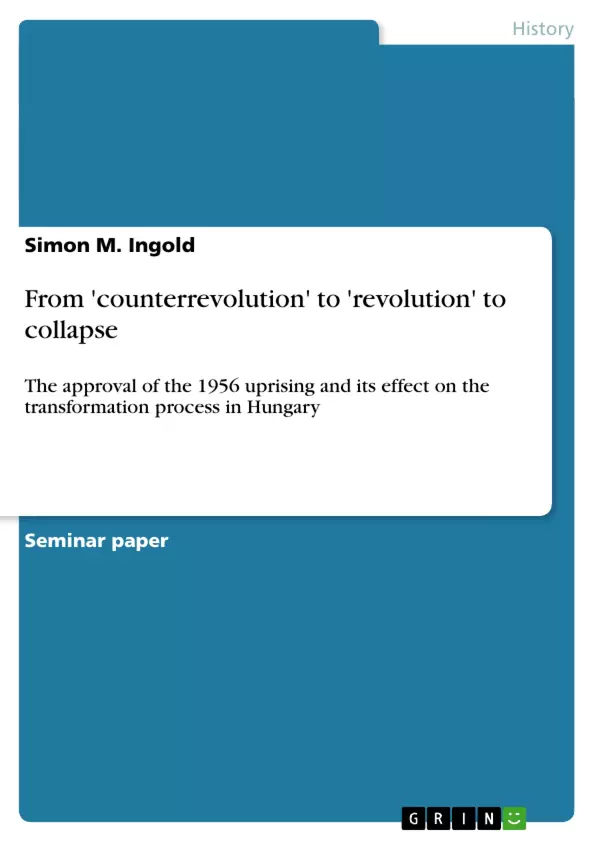The public revelation of the Historical Subcommittee’s findings by Pozsgay really stood at the beginning of a chain of further critical events – especially the highly symbolic re-interment of former Prime Minister Imre Nagy − that eventually caused the peaceful collapse of the Hungarian “people’s democracy”. It can therefore rightly be called the root cause of the rapid disintegration of socialist rule in Hungary. The Politburo members’ different reactions to this unexpected and radical step are highly indicative of the deep fault lines that existed between the reformist and conservative wings of the party. But they also express a shared insight that a point of no return had been reached. Based on the minutes of the meeting of the MSzMP CC Political Committee, I will try to clarify the signifi-cance of the moment and its relevance for the further course of events. First, I present the historical background of the document, specifically its principle point of reference, the 1956 uprising. This is followed by an analysis of the document itself. What views are expressed? How stringent is the ar-gumentation, i.e. what are the consistencies and contradictions? Finally, I will comment on the rele-vance of the document with regard to the ensuing historical developments in Hungary.
Inhaltsverzeichnis (Table of Contents)
- Introduction
- The faltering domino: Hungary's way toward the 1956 uprising
- The inside perspective: Minutes of the Meeting of the MSZMP CC Political Committee, 31 January 1989
- Chain reaction unleashed: the factors leading to the demise of communism in Hungary
Zielsetzung und Themenschwerpunkte (Objectives and Key Themes)
The primary objective of this seminar paper is to analyze the implications of a controversial statement made by Imre Pozsgay regarding the 1956 uprising. Specifically, the paper aims to examine the reaction of the Hungarian Socialist Workers' Party Central Committee (MSZMP CC) to Pozsgay's declaration that the uprising should no longer be termed a "counterrevolution," but rather a people's uprising. The analysis draws upon the minutes of the MSZMP CC Political Committee meeting on 31 January 1989, revealing key insights into the political and social landscape of Hungary in the years leading up to the collapse of communist rule.
- The significance of the 1956 uprising as a turning point in Hungarian history
- The differing perspectives within the MSZMP CC on the historical narrative of the uprising
- The impact of Pozsgay's declaration on the political landscape and the future of socialism in Hungary
- The role of the Historical Subcommittee's findings in shaping public opinion and historical understanding
- The gradual transition from a "counterrevolution" to a "revolution" narrative in Hungary
Zusammenfassung der Kapitel (Chapter Summaries)
- Introduction: This section introduces the context of the MSZMP CC meeting on 31 January 1989, where Pozsgay's controversial statement regarding the 1956 uprising was discussed. It highlights the significance of this event in challenging the established narrative of the past and paving the way for a reassessment of Hungarian history.
- The faltering domino: Hungary's way toward the 1956 uprising: This chapter provides a historical background to the 1956 uprising, tracing its roots in the political and social context of Hungary in the post-war period. It examines the role of key figures like Mátyás Rákosi and Imre Nagy in shaping the political landscape and the events that ultimately led to the outbreak of the uprising.
- The inside perspective: Minutes of the Meeting of the MSZMP CC Political Committee, 31 January 1989: This chapter focuses on the analysis of the minutes from the meeting, highlighting the diverse reactions of the Politburo members to Pozsgay's statement. It examines the underlying tensions between the reformist and conservative factions within the party and the implications of Pozsgay's actions for the future of the Hungarian communist regime.
Schlüsselwörter (Keywords)
The central keywords and focus topics of this paper are: 1956 Hungarian Uprising, Imre Pozsgay, MSZMP CC, Historical Subcommittee, counterrevolution, revolution, socialist regime, political transition, historical narrative, Cold War, post-war Hungary.
Frequently Asked Questions
What was the significance of Imre Pozsgay's statement in 1989?
Pozsgay declared that the 1956 uprising was a "people's uprising" rather than a "counterrevolution." This challenged the core legitimacy of the socialist regime and triggered its peaceful collapse.
What happened during the 1956 Hungarian Uprising?
The 1956 uprising was a nationwide revolt against the Soviet-imposed policies of the Hungarian government. It was a pivotal moment that remained a taboo subject until the late 1980s.
How did the MSzMP Politburo react to Pozsgay's declaration?
The reactions revealed deep fault lines between reformist and conservative wings. While some were shocked, there was a shared insight that a "point of no return" in Hungarian politics had been reached.
Who was Imre Nagy?
Imre Nagy was the Prime Minister during the 1956 uprising. His symbolic re-interment in 1989 became a key event in the disintegration of communist rule in Hungary.
What was the Historical Subcommittee's role?
The subcommittee was tasked with re-evaluating the last 40 years of Hungarian history. Its findings provided the empirical basis for Pozsgay to challenge the official "counterrevolution" narrative.
Why is this moment called the "root cause" of the collapse?
By redefining 1956 as a revolution, the party admitted that its own origin was based on the suppression of a popular movement, effectively destroying its ideological foundation.
- Quote paper
- M.A. Simon M. Ingold (Author), 2005, From 'counterrevolution' to 'revolution' to collapse, Munich, GRIN Verlag, https://www.grin.com/document/83098



